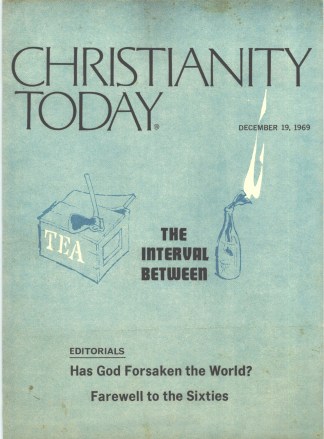Christianity has often been labeled a spectator sport. One wag went a step further by facetiously comparing the Church of the 1960s to a hard-fought football game: eleven men on the field who need a rest and fifty thousand in the stands who need the exercise.
There is some graphic truth in the analogy. The Church’s active “players” are relatively few in number, and many of them are weary and dry of ideas, moving along largely on momentum. The cheering section is large and vocal, making itself heard on every dramatic play; but it is unwilling or unable to get involved in the action.
No one factor can account for the inaction of the evangelical masses. Our fast-paced life is partly responsible. So is inadequate leadership. Sheer indifference also takes its toll.
Some, of course, want to join the battle but can’t. The Church has not yet made room for their talents nor related its mission to their Spirit-born burden. Perhaps this ought to be made more of a concern than our worry about adequate numerical forces. We all know the stories about the potential of a minority.
But the problem runs much deeper. This was the decade of change and uncertainty, of unfaith and disorder. It was the decade of the Second Vatican Council, the new morality, the big plunge into secularity and secularization, the popularization of process theology, the death-of-God flap, and the rise of a so-called theology of hope. It was a decade of violence—in the cities and on the campuses, in Viet Nam and the Middle East. It was a decade of shifting political power, of repression in Czechoslovakia and China, of acute racial tension, of mushrooming population and urbanization, and of growing ecological anxiety.
All these were developments of substantial consequence. Which was the most important? Or were they all overshadowed by the spacemen and their two lunar landings?
We suggest that the most surprising development of the sixties and the one with the most far-reaching significance was the rise of the hippie culture and its impact upon the world. For the Church this has meant an alarming defection of young people. No other trend so urgently demands the Church’s attention.
The hippies and their more respectable-looking fellow travelers should astonish the older generation, not because they protest the war or let their hair grow long, but because they represent an anti-materialistic trend. In this they stand between East and West—the East that officially espouses materialism but in reality has not enough goods to gloat over (and therefore appears attractively austere) and the West that theoretically renounces materialism but in practice embraces it. The hippies escape the psychological effects of their ambivalence by taking drugs and by keeping preoccupied with humane causes.What has happened is that for the time being hippiedom has captured the cultural initiative—in drama, in music, in art, and on the printed page. The Church, which again had the opportunity to move in on a changing mood, has been outdone. For lack of an authentic and relevant Christian dynamic, a humanistic, existential, irrational outlook has taken hold.










